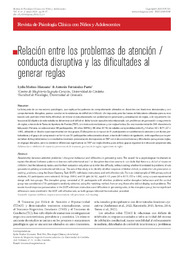Por favor, use este identificador para citar o enlazar este ítem:
https://hdl.handle.net/11000/32072Registro completo de metadatos
| Campo DC | Valor | Lengua/Idioma |
|---|---|---|
| dc.contributor.author | Muñoz-Manzano, Lydia | - |
| dc.contributor.author | Fernández-Parra, Antonio | - |
| dc.contributor.other | Departamentos de la UMH::Psicología de la Salud | es_ES |
| dc.date.accessioned | 2024-05-08T12:22:15Z | - |
| dc.date.available | 2024-05-08T12:22:15Z | - |
| dc.date.created | 2024-05 | - |
| dc.identifier.citation | Revista de Psicología Clínica con Niños y Adolescentes (RPCNA) Vol. 11, Nº 2 (Mayo 2024) | es_ES |
| dc.identifier.issn | 2340-8340 | - |
| dc.identifier.uri | https://hdl.handle.net/11000/32072 | - |
| dc.description.abstract | La búsqueda de un mecanismo psicológico, que explique los patrones de comportamiento alterados en discentes con trastornos atencionales y con comportamiento disruptivo, parece concluir en la existencia de déficit de inhibición de respuesta, pero las tareas de laboratorio utilizadas para su evaluación solo permiten inferir dicha dificultad, sin indicar si está relacionada con problemas de generación y actualización de reglas, o de seguimiento instruccional. El objetivo de este estudio es determinar si el déficit en dicha función ejecutiva está relacionado con problemas de generación o seguimiento de reglas, a través de la Tarea de Apertura de Puertas (TAP), con instrucciones básicas y con regla efectiva. De una muestra inicial de 395 discentes de Educación Primaria, se seleccionaron 62 participantes, 36 niños (58%) y 26 niñas (41%) de edades comprendidas entre 6 y 12 años (M = 8.77; DT = 1.89), utilizando un diseño cuasi-experimental con dos grupos. El disruptivo se compuso de 31 participantes con problemas de atención y conductas perturbadoras y el grupo de comparación se formó con 31 participantes seleccionados al azar, a través del método de igualación, entre aquellos que no presentaban dicha problemática. Los resultados mostraron perseveración de respuesta en TAP con instrucciones básicas y dificultades para generar reglas, en el grupo disruptivo, pero no existieron diferencias significativas en TAP con regla efectiva, pues ambos grupos siguieron la instrucción proporcionada. | es_ES |
| dc.description.abstract | Relationship between attention problems / disruptive behaviour and difficulties in generating rules. The search for a psychological mechanism to explain the altered behavior patterns in learners with attentional and / or disruptive disorders seems to conclude that there is a deficit of response inhibition, but the laboratoty tasks used for their evaluation only allow us to infer this difficulty, without stating whether it is related to problems of rule generation/updating or instructional follow-up. The aim of this study is to identify whether response inhibition deficit, is related to rule generation or tracking problems, using the Dood Opening Task (DOT), with basic instructions and with effective rule. From an initial sample of 395 primary school students, 62 participants were selected, 36 boys (58%) and 26 girls (41%), aged 6-12 years (M = 8.77; SD = 1.89), using a quasi-experimental design with two groups. The disruptive group consisted of 31 participants with attention problems and/or disruptive behaviours and the control group was constituted of 31 participants randomly selected, using the matching method, from among those who did not display such problems. The results found response perseveration in the DOT with basic instructions and difficulties in generating rules, in the disruptive group, but no significant differences were identified in the DOT with effective rule, as both groups followed the instruction provided. | es_ES |
| dc.format | application/pdf | es_ES |
| dc.format.extent | 9 | es_ES |
| dc.language.iso | spa | es_ES |
| dc.publisher | Universidad Miguel Hernández de Elche | es_ES |
| dc.rights | info:eu-repo/semantics/openAccess | es_ES |
| dc.rights.uri | http://creativecommons.org/licenses/by-nc-nd/4.0/ | * |
| dc.subject | inhibición de respuesta | es_ES |
| dc.subject | perseveración de respuesta | es_ES |
| dc.subject | generación de reglas | es_ES |
| dc.subject | seguimiento de reglas | es_ES |
| dc.subject | response inhibition | es_ES |
| dc.subject | response perseveration | es_ES |
| dc.subject | rule generation | es_ES |
| dc.subject | rule tracking | es_ES |
| dc.subject.other | CDU::1 - Filosofía y psicología::159.9 - Psicología | es_ES |
| dc.title | Relación entre los problemas de atención / conducta disruptiva y las dificultades al generar reglas | es_ES |
| dc.type | info:eu-repo/semantics/article | es_ES |
| dc.relation.publisherversion | https://doi.org/10.21134/rpcna.2024.11.2.4 | es_ES |

Ver/Abrir:
2339_1-2-2.pdf
204,89 kB
Adobe PDF
Compartir:
 La licencia se describe como: Atribución-NonComercial-NoDerivada 4.0 Internacional.
La licencia se describe como: Atribución-NonComercial-NoDerivada 4.0 Internacional.
.png)